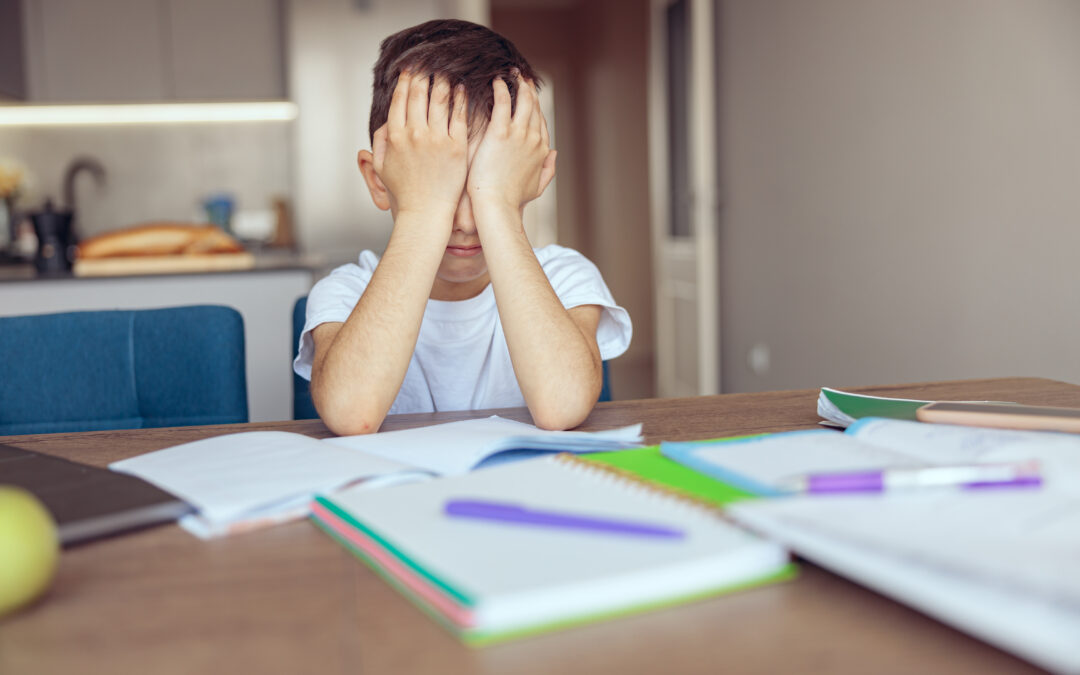It’s nearing the end of your home day schoolwork. As your child begins cleaning up their work space, Mom starts checking over their work making sure everything was understood and done correctly.
You notice that she missed a couple of math problems so you circle them and call your child back. “Honey, great job on this math. I circled numbers 2, 7, and 13 that you got wrong. Can you come over here and correct these?”
What happens next?
Tears, exasperation, drama, and a melting down child because the answers are wrong, or because they have to fix them.
Sound familiar?
The typical parent response is often one of two things:
- The sing songy, sweet Mama voice saying, “Oh sweetheart, you don’t need to get upset. You are so smart. You just need to fix these right here. Let me stand here and help you.”
- “Why on earth are you acting like this? If Mr. Brown was telling you to fix these answers you wouldn’t be melting down and throwing a fit in the middle of class would you? You absolutely better not do that!”
Both responses are emotionally charged, just on different ends of the spectrum and most of the time, our children who get extremely emotional over schoolwork, wrong answers or correcting mistakes simply need fewer emotionally charged confrontations and SPACE.
Try this instead.
“Hey sweetheart. Great job on this math paper. I circled numbers 2, 7, and 13. You may want to look at those. I need to go get started on laundry. If you need some help or clarification, come get me and let me know.” AND THEN WALK AWAY.
What we typically do as parents when our children get wrong answers on their schoolwork or have to correct something, we stand over them. We stand over them, and hover, often nitpicking their work, being overly specific in how we want them to fix it, and we frustrate them because “this should be simple and I know you already know how to do this.” For our emotional, perfectionist driven kids, and our strong willed kids, this response makes them dig in their heels.
This would be similar to you being at work all day and you prepared a company budget or put together a product launch presentation and your boss walked into the room. “Hey, this is good, but some of your line items are off, and you didn’t present this information well enough in this section. Can you fix this?” And then he stands there. He puts his hand on the back of your chair and watches as you type and work to fix your mistakes. As adults, we would not handle this well. Our kids don’t handle it well either.
You need space and they need space.
Another reason our kids don’t do this at school is partly because they aren’t within the normal emotional comfort of their parents (which is good and normal), but also because teachers don’t tend to hover. The classroom environment naturally gives space. When you have a class of students teachers tend to point out areas that need improvement and move on, leaving the students to work out the mistakes. Then as needed, students ask for help or clarification. But this isn’t what we tend to do at home. We emotionally charge the situation by being overly sweet and trying to build confidence (which at the moment is not what they are usually needing) or by getting upset at their meltdown. Both ends of the spectrum often don’t work.
Instead, bring their attention to what needs to be fixed or worked on, and walk away.
When you walk away you are giving them space to deal with their own frustration. Their frustration isn’t necessarily bad and not even something they can directly just “not feel.” So instead of fighting them on it, give them space to wrestle with their own emotions without you standing over them. Give them space to own their own reactions.
The other thing giving them space will do is help your reaction. We cannot control our kids emotional reactions (as much as some parenting gurus want to make you believe you can). But what we CAN do is control our OWN reaction. We know we don’t want to fight or wrestle with them, so space takes us out of the immediate emotionally charged space. When we control our own reactions, it makes us more calm to deal with what’s in front of us, and it helps our kids to calm down.


